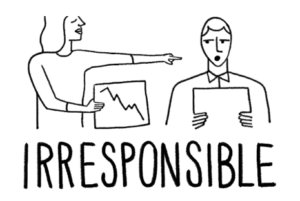 This week we continue the serialization of, How (NOT) to Be a Leader Volume 1, in preparation for the release of the next two books, How (NOT) to Build a Great Team and How (NOT) to Create a Winning Strategy. We hope you will enjoy Chapter 21 – Winning the Blame Game.
This week we continue the serialization of, How (NOT) to Be a Leader Volume 1, in preparation for the release of the next two books, How (NOT) to Build a Great Team and How (NOT) to Create a Winning Strategy. We hope you will enjoy Chapter 21 – Winning the Blame Game.
Sent: Friday, October 18 at 5:45 am
From: VP Operations
To: CEO
Subject: Production Schedule Behind
Mark,
We have a huge problem with the production schedule.
It’s 6 weeks behind and we’re at risk of not getting the product to market in time for the holidays. I told Tom a month ago that he needed to step it up and start creating overtime schedules for his team so this wouldn’t happen. Now finance is saying that they wouldn’t approve the overtime because we don’t have the funds, but nobody on that team told me at the time. Max’s situation with his unhappy development team doesn’t help matters. They hate him, productivity is suffering, and he’s not doing anything about it. Sue is a basket case, she missed 4 days last month because of a sick kid or something and didn’t hire the people we needed in Q2. To make matters worse, customer service has a massive backlog again—I was totally unaware of this until today. The whole thing is just a mess.
Leadership is about holding others accountable and not holding back when it comes time to call out others who aren’t pulling their weight. The best way to not end up holding the bag is to have a constant eye on your peers and make sure that your superiors know exactly where to lay the blame when things go sideways. Make sure that those beneath you never blame you. Sometimes you must give everyone insight when others’ poor performance isn’t so obvious, and sometimes you might even need to inflate the story to make sure the responsibility is deflected away from you.
The more you focus on blaming, and the more detailed you can be in your accounts of where to lay that blame, the more confusing it will become for those you are making your case to. This is a good thing! Just keep piling it on in a never‑ending stream of crafty storytelling sprinkled with somewhat truthful accounts of this and that injustice. The more you stay at it, the more solid the perception of your lack of responsibility will be.
As a leader, it’s important to recognize and accept the fact that you are surrounded by incompetence. Laziness, apathy, distraction, stupidity, low energy, lack of stamina, lying, failure, general loserness, ugliness, and weakness is everywhere you look. You should always be looking for incompetence, and when you find it, point it out loudly and with complete conviction and confidence. One of the most valuable qualities in a good leader is awareness, including self‑awareness, of the fact that you didn’t get to where you are by being responsible for anything failure related. You got here by being responsible for success only. And that which is perceived as failure is actually success because if it hadn’t failed like you intended it to, it wouldn’t have been so successful. Or something like that.
Let others worry about the view from under the bus. You’re too busy driving it.
Let’s Get Real
A cornerstone of great leadership is accountability and taking responsibility for yourself first and foremost. Blaming others is not only poor leadership, it has little if nothing to do with a solution to a problem. When people state the problem but offer nothing in the way of a solution, the only thing they are solving is how to take the focus off of themselves and project it onto others.
At the same time, some good leaders take too much of the blame for the shortcomings of others. Where did I go wrong? What could I have done differently? How did I let them down? While doing some of this kind of self‑reflection is an important exercise in order to learn and improve, doing too much of it is simply not assigning accountability to those to whom it should be assigned. Be cautious with accountability—there is a fine line between ownership and blame. Awareness and a constant monitoring of this ebb and flow will help you both learn and teach.
We will always have performance problems with ourselves, with our peers, and with those, we lead. But as leaders, those are the problems we’re employed to solve. If we’re unable to solve them, then we ourselves are the performance problem.
There are no winners in the blame game because only losers play. As Arnold H. Glasow said, “A good leader takes a little more than his share of the blame, a little less than his share of the credit.”
Download this chapter for free – How (NOT) to Be a Leader – Chapter 21
